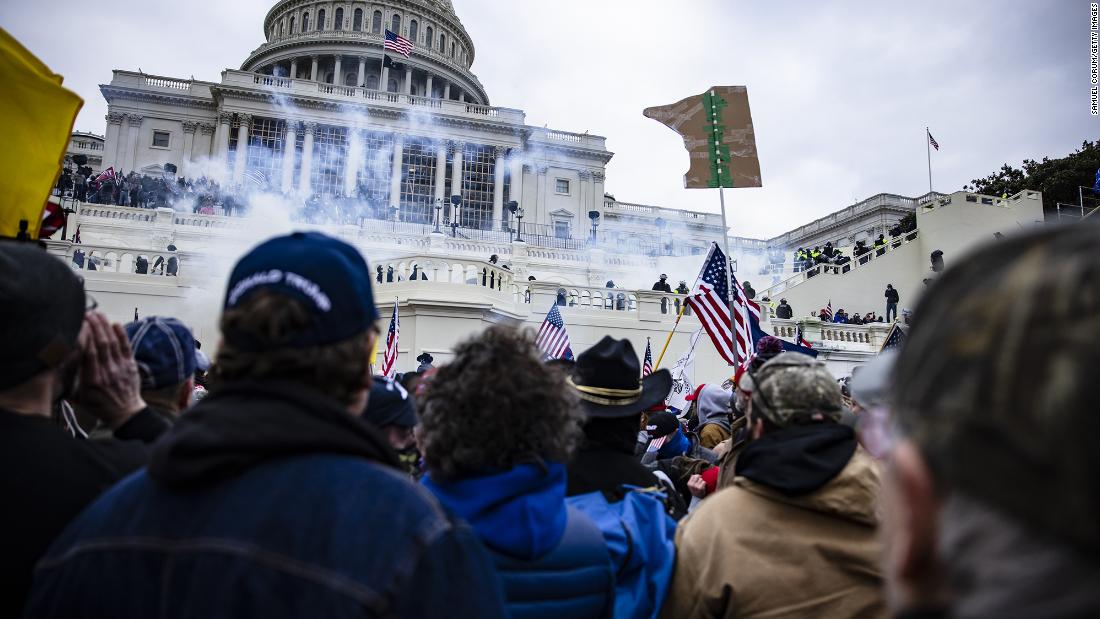The data collected so far includes evidence of contact with lawmakers on the days around 6 January, as well as communications between alleged rioters discussing their associations with members of Congress, the official said.
The existence of such communications does not necessarily indicate irregularities by lawmakers and investigators are not yet targeting members of Congress in the investigation, the official noted. If investigators find the probable cause that lawmakers or their teams possibly helped the rebels, they can seek warrants to obtain the content of the communications. There is no indication that they have taken this step at this time.
With about 300 people facing charges, the investigation has shifted from what police consider the arrests of people accused of participating in the riot to those who allegedly conspired and planned the attack to interrupt Congress’ constitutional process of certifying election results.
Justice Department officials have appointed more than two dozen prosecutors, including some from outside Washington, to investigate more complex issues, including possible financing of insurrectionists and whether political figures, including lawmakers and officials, helped in the attack, the American official said.
Law enforcement officials say one of the first steps taken after the insurrection was to seek data from cell phone towers to try to identify people on Capitol Hill that day, a tactic permitted by existing law. This was necessary, officials say, because among the multiple failures that day was the United States Capitol Police allowing hundreds of people who had attacked the building to leave without being arrested.
Authorities announced only a handful of arrests on January 6, and the FBI and other agencies subsequently used a trawl across the country to find the protesters.
The officers used what they call an “exclusion list”. The list allows investigators to view mobile devices that have been authorized to be on Capitol Hill – such as members of Congress and officials, law enforcement officials and other government and public security officials – while examining people who have not been allowed to enter the building, according to a federal court case in a riot-related case.
The FBI and the Justice Department declined to comment.
Investigators also have security footage from the Capitol Police that Democrats want to examine to see if any members visited the riot participants before January 6. Democrats accused unidentified Republicans of providing access to rally participants, suggesting that they were opportunities for surveillance before the riot.
Other lawmakers have a separate concern: as investigators get closer to lawmakers’ activities, some members of Congress may use the protections of the Constitution Speech or the Debate Clause to try to block the FBI’s work. The clause grants legal immunity to members of Congress in the performance of their legislative functions.
Senator Sheldon Whitehouse, a Democrat from Rhode Island, said he asked the Senate Ethics Committee to investigate why he believes that Congress will be able to obtain information that the FBI may have trouble obtaining because of speech or debate protections.
Whitehouse, in a telephone interview with CNN, said that his effort is aimed at “ensuring that this is not an investigation limited to individuals who attacked and entered the Capitol on January 6”, adding that “potential blame for members of Congress” has to be under study.
The new phase of the federal investigation follows the lines that federal authorities outlined after the attack. The District Attorney of the District of Columbia, Michael Sherwin, said that after the initial stage of capturing protesters, prosecutors and investigators they would begin to examine more difficult aspects: including the funding and organization of the riot, the probable interviews of lawmakers and even if the incitement at the rally held by President Donald Trump before the riot violated all laws. Prosecutors have also been pushing to open charges of sedition against some alleged protesters, a move pending approval by the Justice Department, according to people informed on the matter.
Sherwin announced that he will go to the Department of Justice to help manage cases for a period while the department sets out a long-term plan for an extensive investigation that will span months.
Bailiffs are aware of the political and constitutional implications of parts of the investigation, particularly those that concern members of Congress, according to law enforcement officials.
So far, investigators have found no evidence that members of Congress knowingly helped or were involved in the insurrection, the US official said. The FBI seized devices belonging to alleged protesters and found communications showing connections that investigators plan to examine in more detail.
In some cases, there is data showing previous contacts with lawmakers, and in others, there are communications between alleged troublemakers discussing their associations with members of Congress. Some alleged protesters also claimed to have provided security for lawmakers
In a case against an alleged leader of the right-wing paramilitary group The Oath Keepers, a defendant claimed that she was recruited to provide security for lawmakers and others on her march to the Capitol.
None of this necessarily indicates transgression by any lawmaker, the US official said.
At Tuesday’s hearing, Wray said he could not provide details about specific steps the FBI has taken while the investigation is underway.
Asked by Hawley about the FBI’s use of metadata and other information from telephone towers, Wray said, “I am sure we are using a variety of legal authorities to examine the metadata.”
Hawley, who helped lead the effort to block Congressional certification of election results during the riot, expressed frustration: “How are we going to know what you are doing with this and how are we going to assess the bureau’s conduct if we don’t. No do I know which authorities you are relying on, what exactly are you doing, what are you maintaining? “Said Hawley. “You’re basically saying ‘just trust us’.”
CNN’s Katelyn Polantz contributed to this report.
